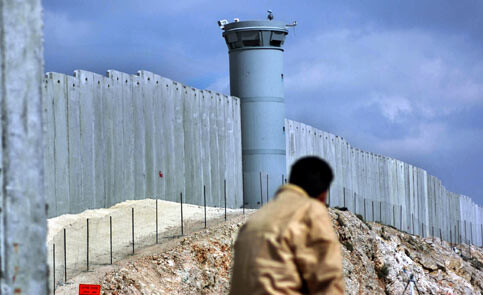Badil 18 November 2006

A general view of the construction site of the Israeli separation wall in Qalandiya between Ramallah and Jerusalem March 18, 2006. (MaanImages/Moamar Awad)
Today, PLO Head of Mission to the United Nations Riyadh Mansour announced that the UN Register of Damage will be re-raised with the General Assembly on 5 December 2006 (BBC Radio-Arabic). Palestinians have many good reasons for doing so; not only is the proposed mechanism for registration seriously flawed, but Palestinians will also be left again without an effective forum for raising claims for restitution and compensation.
On 9 July 2004, the International Court of Justice (ICJ) ruled that Israel should dismantle the illegal Wall under construction in occupied Palestinian territory, return confiscated Palestinian properties and provide compensation for damages. The Court also ruled that all states should abstain from recognizing and rendering assistance to the maintenance of Israel’s Wall regime, and consider what further action is required to bring and end to the illegal situation.
On 2 August 2004, the UN General Assembly requested the Secretary-General to establish a ‘Register of Damage’ caused by the Wall to all natural or legal persons. The Register has remained the only practical response of UN members states to Israel’s illegal Wall and it has not yet materialized.
More than two years later, on 17 October 2006, UN Secretary-General issued a report outlining the institutional framework and modus operandi of the Register. This model, however, raises many questions and concerns.
Who can register which damages? - Israel’s Wall results in loss of access to education and health services, family and friends causing major, albeit non-material, damage to Palestinian individuals and society. Secretary-General Anan’s report fails to specify eligibility criteria and types of damage to be registered. While the ICJ and the UN General Assembly recommended in 2004 that both material and non-material damages caused by the Wall should be addressed, only material damages are addressed by the Secretary-General in 2006. Moreover, further specification of the terms of reference of the Register is deferred to a team of experts to be recruited by the three-member expert Board yet to be appointed by the Secretary-General.
No assessment of damages - The Register, as currently pursued by the Secretary-General, suggests that no professional assessment and validation of reported damages will be undertaken. Claims will rather be registered at face value, a procedure which would diminish the relevance of this Register as an official record for future claims.
No field presence - Since Israel does not approve of the presence of the Register in the occupied Palestinian territory, a non-confrontational solution was found: the Register will be an electronic database at the United Nations in Vienna, far away from the site of the violation and the Palestinian claimants. No cooperation is suggested between the expert team in Vienna and any of the numerous international and local organizations present in the occupied Palestinian territories.
Lessons learned from the past - The Register will be useless unless these flaws are repaired. The United Nations have shown that they can do better: an earlier UN record of Palestinian properties lost as a result of displacement and dispossession by Israel in 1948 registered certain material losses only - but it had field presence in Israel and included a professional methodology for the assessment and validation (and later on valuation) of data. This record compiled by the UN Conciliation Commission on Palestine (UNCCP) has since served as a major reference for Palestinians demanding restitution and compensation. Maybe the United Nations wish to avoid the creation of a second record which will support this Palestinian demand, this time from the 1967 occupied Palestinian territories?
No doubt, the fact that the UN Register of Damage incurred by the Wall has not been conceived by the United Nations as a full-fledged claims mechanism is its major flaw: Palestinians may register but will not obtain remedy through restitution and compensation. Given the current relations of power among UN member states, this shortcoming is unlikely to be rectified in forthcoming debates of the General Assembly. Both Palestinian refugees and displaced of 1948, and those dispossessed and displaced by Israel’s illegal Wall today, will be able to effectively claim restitution and compensation only when Israel and UN member states will respect international law. They will do so only if pressured by civil society.
BADIL Resource Center for Palestinian Residency & Refugee Rights takes a rights-based approach to the Palestinian refugee issue through research, advocacy and support of community participation in the search for durable solutions.
Related Links